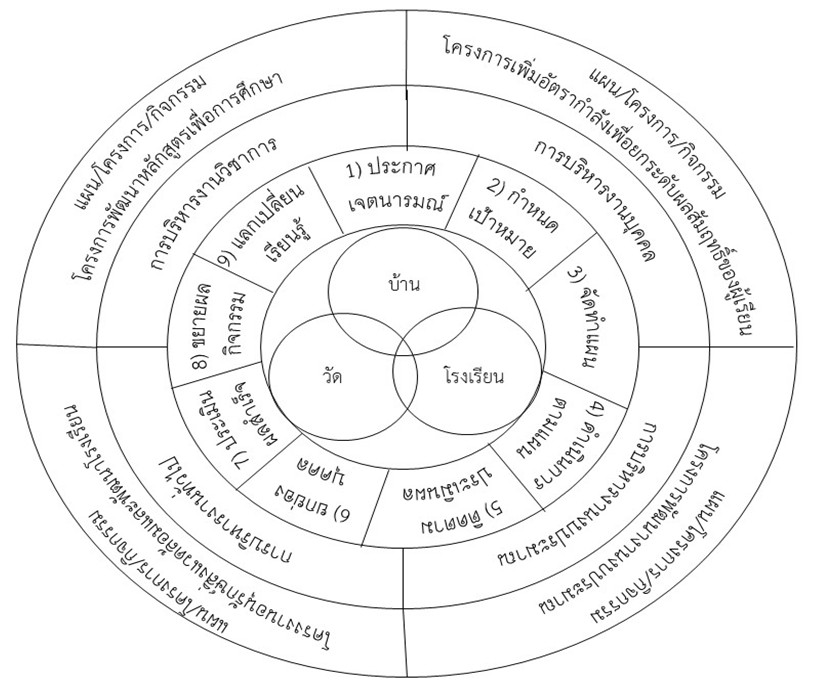Participatory School Administration Based on The 9 Steps of The School Bowon (Village Temple School) of Banthungkruad School Under the Nakhon Si Thammarat Primary Educational Service Area Office 2
Main Article Content
Abstract
The objectives of this research are to study the current state of participatory school administration at Banthungkruad School, propose guidelines based on The 9 Steps of The School Bowon, and evaluate these guidelines. This qualitative study collected data through in-depth interviews with 15 stakeholders and 5 experts, as well as focus group discussions with 7 experts. Data were analyzed descriptively. Findings reveal that participatory administration at Banthungkruad School lacks full understanding and engagement among all stakeholders in four key areas: curriculum design, resource mobilization, staffing, and infrastructure development. Administrators, teachers, parents, and the school committee must collaborate through meetings, planning, implementation, and joint problem-solving to enhance administrative effectiveness. 2) Management guidelines according to the principles of Bowon in the management of the 4 departments in jointly creating the curriculum, mobilizing resources, determining staffing, improving and developing school buildings, by operating through the Bowon 9 process as follows: (1) Declaration of intention, (2) Setting goals, (3) Planning, (4) Implementing, (5) Monitoring and evaluating, (6) Honoring individuals, (7) Evaluating success, (8) Expanding activities, and (9) Exchanging knowledge. 3) The evaluation of this administrative approach indicates its appropriateness, feasibility, and benefits in participatory school administration under the Bowon principle, contributing to a more effective educational management system.
Article Details

This work is licensed under a Creative Commons Attribution-NonCommercial-NoDerivatives 4.0 International License.
References
กรมการศาสนา กระทรวงวัฒนธรรม. (2565). แนวทางการดำเนินงานโครงการพลังบวร : ชุมชน คุณธรรม ลานธรรม ลานวิถีไทย ประจำปีงบประมาณ พ.ศ. 2565. กรุงเทพฯ: สำนักงานปลัดกระทรวงวัฒนธรรม.
ชยุตพงศ์ สมจริง. (2565). แนวทางการมีส่วนร่วมของชุมชนในการจัดทำหลักสูตรท้องถิ่นของสถานศึกษาเครือข่ายชัยบุรี สังกัดสำนักงานเขตพื้นที่การศึกษาประถมศึกษาสุราษฎร์ธานี เขต 3. (ครุศาสตรมหาบัณฑิต, มหาวิทยาลัยมหาจุฬาลงกรณราชวิทยาลัย).
นัชมูดิน สาแม. (2566). การบริหารแบบมีส่วนร่วมของผู้บริหารโรงเรียนในสมาคมโรงเรียนเอกชนในระบบจังหวัดปัตตานี. (ครุศาสตรมหาบัณฑิต, มหาวิทยาลัยราชภัฏยะลา).
พระครูปลัดธรรมสรณ์ โสภาบุตร. (2562). การพัฒนาโรงเรียนวิถีพุทธตามหลักบวรแบบมีส่วนร่วมของผู้ปกครองในโรงเรียนเมืองโพธิ์ชัย สังกัดสำนักงานเขตพื้นที่การศึกษาประถมศึกษาร้อยเอ็ด เขต 3. (พุทธศาสตรมหาบัณฑิต, มหาวิทยาลัยมหาจุฬาลงกรณราชวิทยาลัย).
พระครูปลัดวีระ อคฺคจิตฺโต. (2565). รูปแบบการบริหารจัดการแหล่งเรียนรู้ชุมชนแบบมีส่วนร่วม โดยพลังบวร. (ครุศาสตรดุษฎีบัณฑิต, มหาวิทยาลัยมหาจุฬาลงกรณราชวิทยาลัย).
โรงเรียนบ้านทุ่งกรวด. (2565). แผนพัฒนาการจัดการศึกษาของสถานศึกษา พ.ศ. 2565. นครศรีธรรมราช: ฝ่ายบริหารทั่วไป.
วิบูลอร นิลพิบูลย์. (2563). การบริหารแบบมีส่วนร่วมกับประสิทธิผลของโรงเรียน สังกัดสำนักงานเขตพื้นที่การศึกษาประถมศึกษานนทบุรีเขต 1. (ศึกษาศาสตรมหาบัณฑิต, มหาวิทยามหาวิทยาลัยศิลปากร).
สำนักงานคณะกรรมการการอุดมศึกษา. (2567). มาตรฐานการศึกษาของชาติ. สืบค้นจาก http://graduatp.sru.ac.th.
สำนักงานเลขาธิการสภาการศึกษา. (2564). รูปแบบการจัดการเรียนรู้แบบมีส่วนร่วมเพื่อประสิทธิภาพการจัดการเรียนรู้. กรุงเทพฯ: สำนักงานเลขาธิการสภาการศึกษา.
อดิเรก บุญคง. (2564). รูปแบบการจัดความร่วมมือในการจัดการศึกษาระหว่างบ้าน วัด โรงเรียน เพื่อ พัฒนาคุณภาพนักเรียนของสถานศึกษาขั้นพื้นฐานในชนบท จังหวัดศรีษะเกษ. (ปรัชญาดุษฎีบัณฑิต, มหาวิทยาลัยมหาสารคาม).

